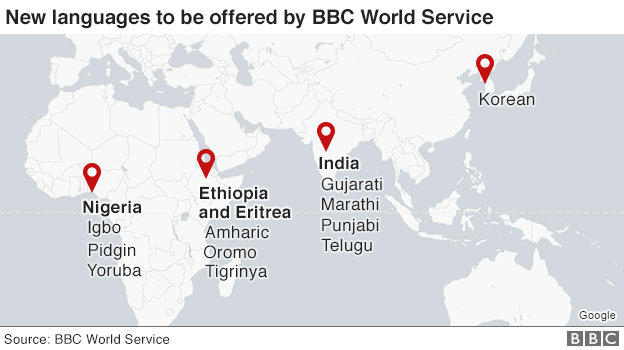(Source: BBC News)
The BBC World Service will launch 11 new language services as part of its biggest expansion “since the 1940s”, the corporation has announced.
The expansion is a result of the funding boost announced by the UK government last year.
The new languages will be Afaan Oromo, Amharic, Gujarati, Igbo, Korean, Marathi, Pidgin, Punjabi, Telugu, Tigrinya, and Yoruba.
The first new services are expected to launch in 2017.
[…]The plans include the expansion of digital services to offer more mobile and video content and a greater social media presence.
On Wednesday the BBC launches a full digital service in Thai, following the success of a Facebook-only “pop-up” service launched in 2014.
Other expansion plans include:
- extended news bulletins in Russian, with regionalised versions for surrounding countries
- enhanced television services across Africa, including more then 30 new TV programmes for partner broadcasters across sub-Saharan Africa
- new regional programming from BBC Arabic
- short-wave and medium-wave radio programmes aimed at audiences in the Korean peninsula, plus online and social media content
- investment in World Service English, with new programmes, more original journalism, and a broader agenda
The new language services mean the BBC World Service will be available in 40 languages, including English.
Lord Hall has set a target for the BBC to reach 500 million people worldwide by its centenary in 2022.
Click here to read the full article…
In addition, Mike Terry, posted a link to this Leading Article from The Times which focuses on the BBC expansion. This content is behind a paywall (though you can register to read two free items per week) but here is an excerpt from the conclusion that I found particularly interesting:
“The radio may seem an irrelevance in the age of the internet but it is the most intimate of the so-called mainstream media and as such poses a challenge to authoritarian rule. Radios are cheap, ubiquitous and can whisper truths under the bedcovers. There is nothing that dictators hate more than direct access to the ears of their subjects.”
Indeed.



BBC is coming back to value the radio and its vision is on the near future, recently the radio is increasing because of Internet and now SDR/DRM radio there is no return. BBC has a great trunph in short wave is its transmitter at Ascension Island I can hear in Brazil in several frequencies transmissions to Africa with quality in SW, on the contrary other european radiobroadcasters left SW, I should mention the persistence of Radio Romenia International without speaking about CRI. BBC has a vision and mission and above all production quality, VOA is pure americanisation. The radio future is brighter.
BBC seems to be somewhat reversing course, with this fairly massive expansion, though there is going to be no return of broadcasting in English, to North America for example, for obvious reasons. It’s true — BBG/VOA/etc seem to be lost. The latest claim by the BBG of substantial increases in audience are dubious, at best. And BBC has a solid foundation of established programming, such as NewsHour and World Have Your Say, that has ongoing significant audiences around the world. Where VOA struggles to provide high quality coverage, especially when it comes to news in the United States, BBC continues as the gold standard, delivering superior programming in English and other languages. Sad story indeed….
Dan,
If you look at the BBC WS’s history over the last 60 years. What they do is every few years they introduce massive cuts as a way to get rid of staff that are closer to retirement. Then a few years later they expand into areas where they have extra money.
A refreshing change of attitude from BBC.
Yes, a refreshing change indeed. I might add that with RT all over the internet BBC should get smart here pretty quick. VOA seems lost in the muddle. I got excellent live coverage of the New Zealand earthquakes from RNZ online and on SW from RNZI. No, I don’t use an internet radio. I have a lot of streaming bookmarks on my desktop.